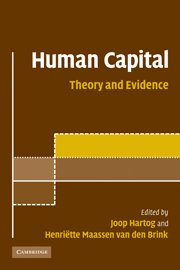Book contents
- Frontmatter
- Contents
- List of figures
- List of tables
- Notes on contributors
- Prologue
- Part I Measuring the benefits from human capital
- Part II Applying and extending the human capital model
- 7 Overeducation in the labour market
- 8 Underinvestment in training?
- 9 Human capital and risk
- Part III Policy interventions
- Epilogue: some reflections on educational policies
- A note on econometrics
- Index
- References
7 - Overeducation in the labour market
Published online by Cambridge University Press: 22 September 2009
- Frontmatter
- Contents
- List of figures
- List of tables
- Notes on contributors
- Prologue
- Part I Measuring the benefits from human capital
- Part II Applying and extending the human capital model
- 7 Overeducation in the labour market
- 8 Underinvestment in training?
- 9 Human capital and risk
- Part III Policy interventions
- Epilogue: some reflections on educational policies
- A note on econometrics
- Index
- References
Summary
Introduction
One of the most important social developments of the past decades in western countries has been the increase in the educational level of the population. The increase in the education level of the workforce has been accompanied by higher than average growth rates for jobs for better-educated workers. Also, for a number of jobs there has been an upgrade in the skills needed to perform adequately. Despite this increase, we may ask whether the increase in the demand for better-educated labour has kept pace with the increase in the supply of skilled workers. If the growth in the supply of better-educated people outpaces the growth in demand, overeducation of the workforce is the likely result. Overeducation is defined as a job–worker match where the worker actually has more education than is required for the job (and conversely for undereducation). It is commonly measured in years. In 1981 Duncan and Hoffman started the overeducation literature by distinguishing education required for the job and actual education. In the 1980s Hartog (see Hartog and Oosterbeek, 1988) introduced the concept of overeducation in the Netherlands, and later continued to contribute (Hartog, 1993, 1997, 2000). At the end of the 1990s he concluded that the ORU specifications (based on over-, required, and undereducation) are useful extensions of the standard Mincer specification (see also chapter 1) but only if these specifications are embedded in structural labour models.
Surveying the literature of the past twenty-five years several explanations can be given for overeducation.
- Type
- Chapter
- Information
- Human CapitalAdvances in Theory and Evidence, pp. 101 - 112Publisher: Cambridge University PressPrint publication year: 2007
References
- 2
- Cited by



